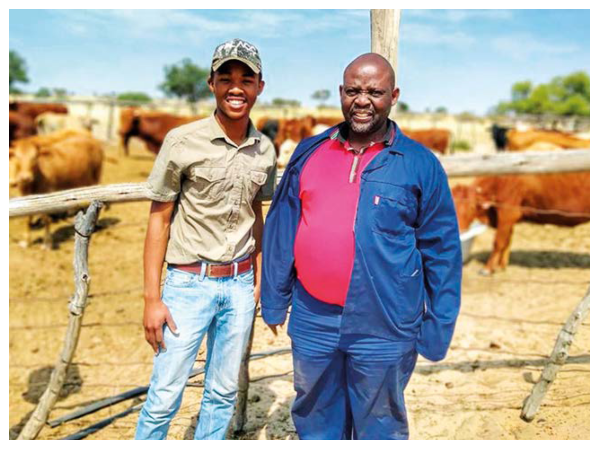
While most of his peers pass their time on social media, he spends his days on horseback in a secluded area in the North West that has barely any network coverage. Thabo Dithakgwe is by no means an average teenager – the young man from Vryburg is revolutionizing the agricultural landscape.
At 19 he’s making a name for himself as the country’s youngest livestock farmer. It runs in his blood, Thabo tells DRUM. “I didn’t just wake up and decide to be a farmer – I was born a farmer.
Everything he knows he’s learnt from his late grandfather, Nasi Dithakgwe, and his father Pushoetsile, from whom he inherited land. The Dithakgwes became the proud owners of Constable Farm after the family won a land claim under Barolong Boo Maiketso Communal Property Association from the government in 2015, allowing them to farm there for 30 years.
Now Thabo runs his 790-hectare farm, which is home to cows, sheep and goats, and he sells the animals he’s raised. Locals in need of livestock for wedding ceremonies, funerals or parties are often surprised when they come face to face with the lanky teen at the farm in Pomfret, about 50km from Morokweng. “You find people go to my father about my animals only for him to refer them back to me,” he says, laughing. He’s also using his youth to his advantage.
Thabo, who’s studying mixed farming at the Potchefstroom College of Agriculture, rattles off a list of new ways to farm. “We have software that makes running a farm more efficient. There are new technologies, such as artificial insemination, which makes it possible for me to buy semen from stud farmers instead of having to buy a bull of my own. “We have social media that we can use to promote our business, tracking devices that can give us live updates of our animals and, if you can afford it, you can purchase a drone to monitor your farm from the comfort of your home.”
It’s this tech savvy that sets Thabo apart from older farmers. “I’m willing to explore new ways and technologies to make farming easier,” he says. As much as he uses technology, the teen’s success also lies in building partnerships with older farmers he meets at agricultural shows. “We didn’t have the means to own farms or engage in farming. “The only way to catch up is by not distancing ourselves from our fellow white farmers because they’ve been in the business for longer and are way more advanced,” he says.
In exchange for their knowledge, Thabo helps usher them into the digital age. He works as a photographer for the older farmers and does promotional videos when they want to advertise their cattle on social media. He’s not afraid to get his hands dirty either. Thabo was just three when Nasi taught him to milk cows. At the time, Nasi owned a communal farm, Makget- lwa Kibitwe, where he bred animals. After he passed away in 2003, Thabo and his father took over the reins of the farm. Thabo was initially the only one of his siblings – Ivy (31), Mohau (23) and Omphemetse (13) – who had a feel for the soil. “My older siblings are more into fashion and my brother does events b u t m y younger sister seems to be developing a love for farming,” he says.
He and his dad have split Constable Farm so they can have their own space. Thabo farms Bonsmara red cattle, Boer goats, and his own breed of sheep that he calls Dorper and Van Roy. He also owns a few horses he uses to get around.
Thabo was 14 when he learnt the ropes of commercial farming. His father had gifted him his first animal, a pregnant heifer, he says. “The heifer gave birth to a bull cow. I hand raised it until it was 18 months and sold it to a local farmer in Maropeng.” Thabo reinvested the R14 000 he made from the sale to buy another cow. “Then I had two breeding females and we started growing. Later, my father donated goats and then I had goats and cattle,” he says. Thabo quickly grew his herd by selling weaners – young animals recently weaned from their mothers. “It takes 24 months for a cow to grow to term,” he explains. “I knew selling two weaners would give me enough money to buy one pregnant heifer, so I started in- creasing the number of breeding females I had to speed up the process of owning more cattle.”
He’s driven by creating jobs in his community. Thabo employs two people and owns 120 cattle but would love to grow his stable. “I want to go into game farming and stud farming,” he says. Stud farming, he believes, is where the real money lies. The price for a single bull can go up to R1,8 million at auctions but before he can branch out he needs more land. Thabo is in talks with the department of rural development and land reform to lease a farm but it’s an uphill battle.
Investors and funders are reluctant to invest in his dreams because of his age, he says, but as a third-generation farmer he’s been working the land for as long as he can remember. All his hard work means he’s missed out on one important thing. “I’ve never been on holiday,” Thabo says. “When my friends went on vacation, I would be on the farm so if there’s something I’d like to do it would be to go on holiday. “For now, though, I’m focused on growing my business.”


















